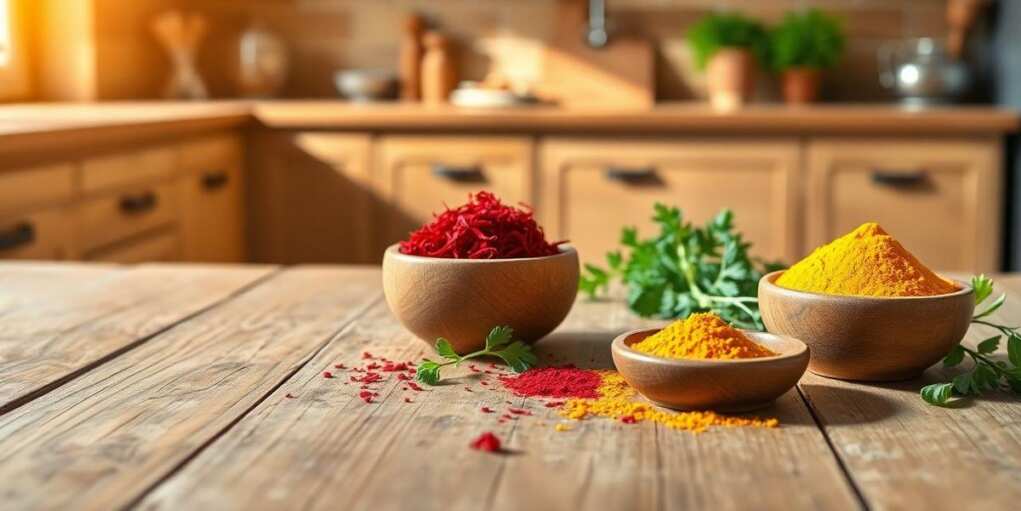Common Spice Boosts Sexual Stamina And Lowers Depression

A common spice used in cooking could work as a natural antidepressant according to a leading psychiatrist who specializes in mental health treatment.
Saffron, found in popular foods and drinks like paella and herbal teas, has shown promise for its ability to boost mood and reduce symptoms of depression. The spice also offers other health benefits that prescription medications cannot match.
Dr. Daniel Amen is a psychiatrist and founder of Amen Clinics in California. He shared his enthusiasm about using saffron for mental health support during an interview with Fox News Digital.
“I love saffron so much. I’m Lebanese, and Middle Eastern folks cook with a lot of saffron. And there’s actually folklore in Iran: If you’re too happy, you must have had saffron.”
Amen pointed to research showing that about 30 milligrams of saffron was equally as effective as antidepressants in randomized trials.
Most SSRI medications can help boost mood. These are selective serotonin reuptake inhibitors that doctors commonly prescribe for depression. But they also pose the risk of decreasing sexual function. Saffron does the opposite according to Amen.
“As a psychiatrist, I don’t want to ruin my patients’ love lives. Saffron increased sexual function [in research].”
Saffron has also been shown to help with memory and focus according to various studies.
A recent study published in Reviews in Clinical Medicine 2025 linked saffron to decreased symptoms of premenstrual syndrome. After eight to 12 weeks of saffron use, participants reported that the supplement significantly reduced the symptoms and severity of PMS.
Additional research published in the Cambridge University Press in May 2025 revealed saffron’s potential to ease depression symptoms.
The review analyzed 192 trials involving more than 17,000 patients and 44 different nutraceuticals to determine which supplements work for depression. Saffron was identified as most effective, showing a moderate to large antidepressant effect.
The analysis also examined how these supplements interacted with prescribed antidepressant medications.
Combining supplements like zinc and curcumins with existing antidepressants were found to improve symptoms. Curcumins are natural compounds found in turmeric.
“So, if you’re on an antidepressant and you want it to work even better, think about zinc and curcumins. Saffron, zinc and curcumins is a great combination.”
While cooking with saffron may not achieve the levels needed to improve mood, saffron supplements are available as capsules, tablets and powdered extract. Thirty milligrams per day is typically the recommended dose for symptom relief.
Long-term use of saffron has yet to be studied. There is some uncertainty around its potency as a supplement, researchers and experts have warned.
According to a medically reviewed WebMD article, taking saffron in high doses or for long periods of time may be risky. It could potentially cause anxiety, appetite changes, upset stomach, sleepiness or headache.
Anyone interested in starting a saffron supplement should first consult with a doctor.
The findings about saffron come at a time when millions of Americans struggle with depression and are looking for alternatives to prescription medications. Many people experience unwanted side effects from traditional antidepressants including weight gain, emotional numbness, and sexual dysfunction.
The sexual side effects of SSRI medications have become a major concern for patients and doctors. Studies show that between 40 and 65 percent of people taking SSRI antidepressants experience some form of sexual dysfunction. This often leads people to stop taking their medication even when it is helping their depression.
Saffron offers a potential solution to this problem. Research shows it can improve mood while actually enhancing sexual function rather than diminishing it. This makes it an attractive option for people who want mental health support without sacrificing their intimate relationships.
The spice has been used in traditional medicine for thousands of years across the Middle East and Asia. Modern research is now confirming what these ancient cultures seemed to understand about saffron’s healing properties.
Saffron is one of the most expensive spices in the world by weight because it takes a huge amount of the crocus flower to produce even a small amount. Each flower only produces three tiny threads of saffron, and they must be harvested by hand.
Despite its high cost as a cooking ingredient, saffron supplements are relatively affordable. A month’s supply of 30-milligram capsules typically costs less than many prescription medications, and unlike pharmaceuticals, saffron does not require insurance approval or doctor’s visits for refills.
The research on saffron represents a growing trend of scientists taking traditional remedies seriously and putting them through rigorous clinical trials. When natural substances perform as well as or better than prescription drugs with fewer side effects, it challenges the assumption that pharmaceutical solutions are always superior.
